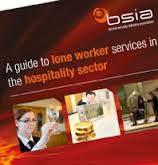The British Security Industry Association’s Lone Worker Section has published a guide to lone worker services in the hospitality sector.
Aimed at employers and others in the hospitality sector, the document highlights the importance of lone worker safety and explains how lone worker devices are helping to keep employees safe.
The BSIA’s section makes the point that more than six million people in the UK work in isolation or without the safety net provided by direct supervision, often in places or circumstances that put them at potential risk. A variety of organisations and industry sectors employ people whose jobs require them to work or operate alone, regularly or occasionally.
Almost by definition, lone working can be both intimidating and at times dangerous, the section adds, so the protection of lone workers involves a twofold approach; not only to provide safeguards but also to offer reassurance to the people involved.
In the hospitality sector, lone workers often include front-of-house hotel staff, pub and night-club employees and motorway services personnel, all of whom are often required to work late at night in locations which put them in contact with the public. However, the hospitality sector is wide-ranging and employees in many other job roles can also benefit from lone worker protection, the section adds.
Like any other UK employers, hospitality companies have a legal duty of care to their employees, which can result in fines and even prison for directors and managers if found negligent.
Craig Swallow, Chairman of the BSIA’s Lone Worker Section and Managing Director of member company SoloProtect, says: “I’m really pleased to see the publication of this valuable guide for those employers and other stake-holders in the hospitality sector. It’s a vertical market where there are many types of lone workers facing risks of verbal abuse as well as slips, trips and falls. Operating with peace of mind and having an ability to raise a discreet call for assistance without causing a fuss is important for hoteliers and other establishment owners.”
The guide details what constitutes lone working, how lone worker protection products and services work and the importance of British Standard BS8484. Including examples of how lone worker companies have provided support to a number of hospitality firms, the guide also outlines what to look for when choosing a system, suggesting that employers look for systems that offer:
• Device or smartphone applications certified to BS8484
• A supplier who can prove that they are audited and certified to BS8484 through audit
• Monitored by an Alarm Receiving Centre certified to BS8484 (part 6) and BS5979 (Cat II)
• Solutions that fit the lone working application and risk profile of your workforce
The guide joins a range of other lone worker publications and is available to download free from: www.bsia.co.uk.










